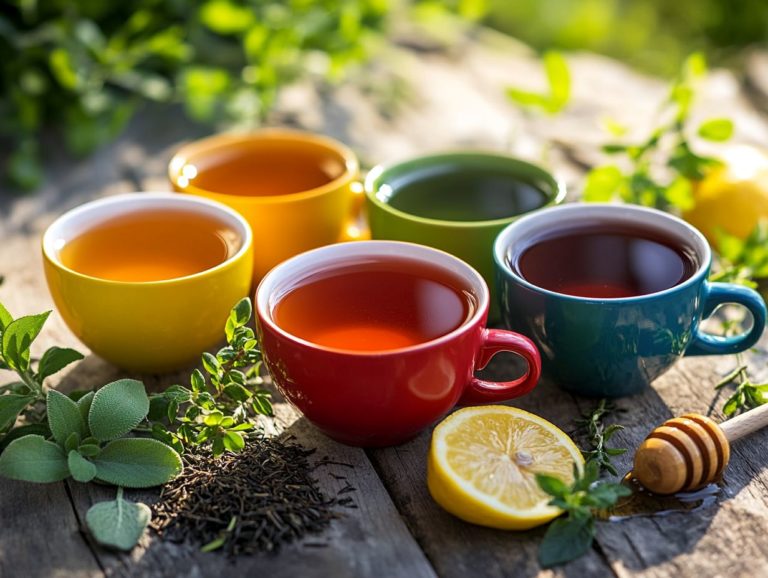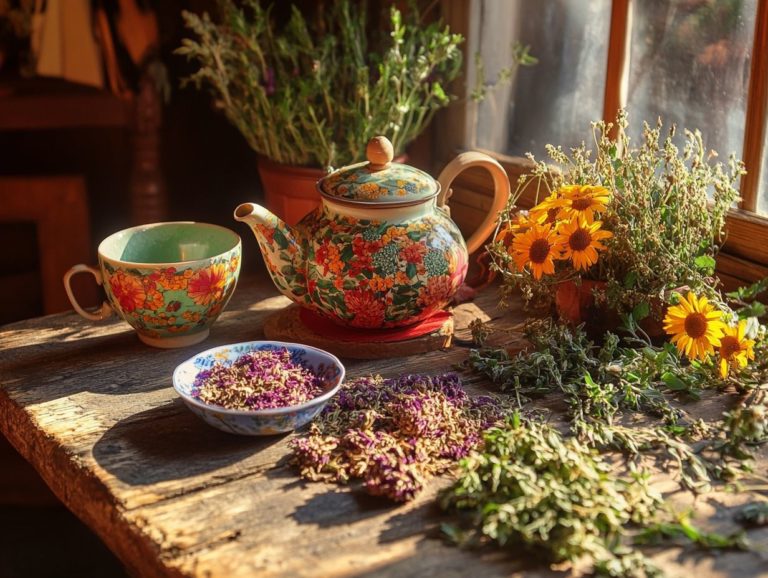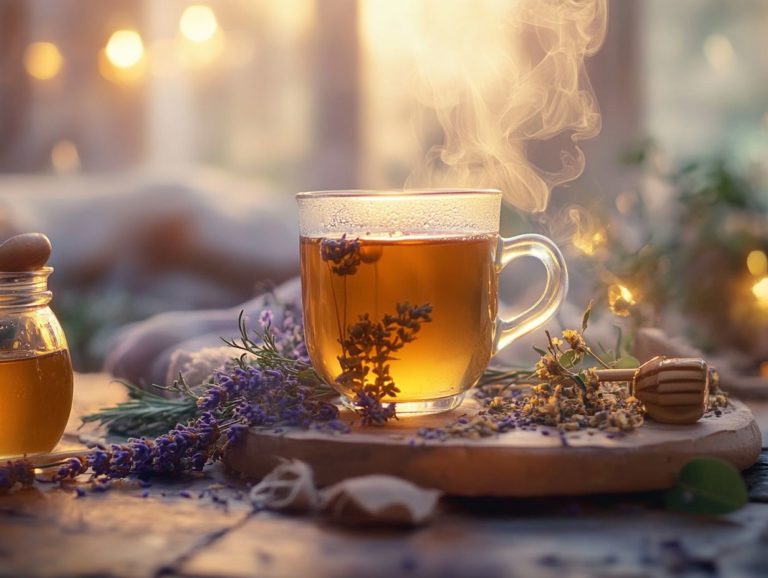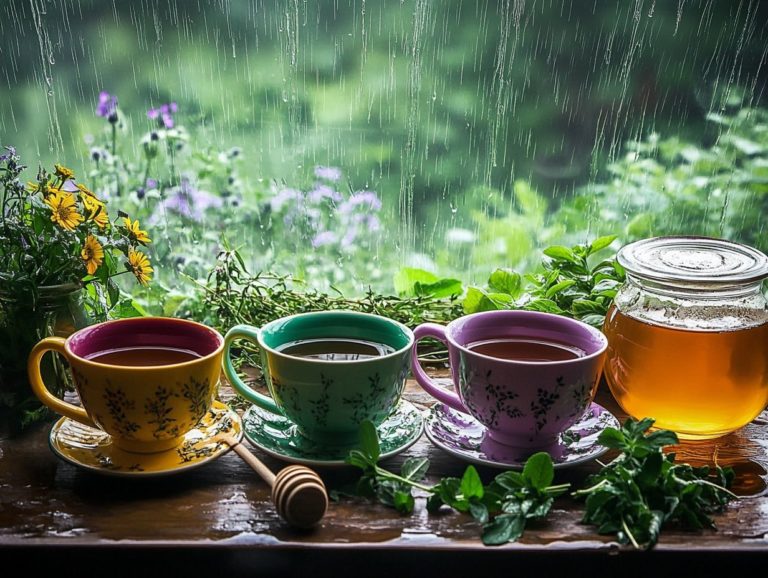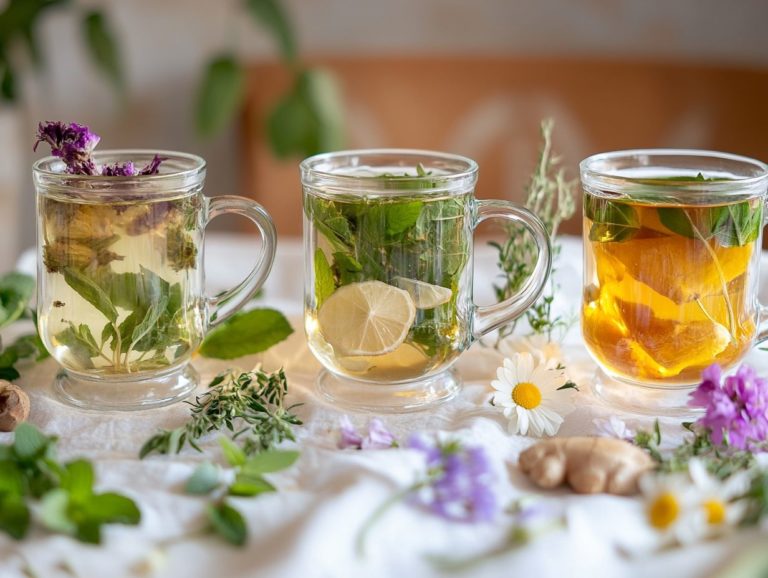5 Spicy Herbal Teas to Warm You Up
As the weather turns chilly, you ll find that nothing quite compares to a steaming cup of tea to warm you up from the inside out. But why settle for the ordinary when you can introduce a little excitement into your brew?
This article delves into five invigorating spicy herbal teas ginger, turmeric, cinnamon, clove, and cayenne pepper that tantalize your taste buds and offer a wealth of health benefits.
You ll explore how these teas can aid digestion, uncover potential risks, and discover tips for seamlessly incorporating them into your daily routine. You might even enjoy a cup of smoky teas to warm up on cold evenings. Get ready to dive into the exciting world of spicy herbal teas!
Contents
- Key Takeaways:
- 1. Ginger Tea
- 2. Turmeric Tea
- 3. Cinnamon Tea
- 4. Clove Tea
- 5. Cayenne Pepper Tea
- What Are the Health Benefits of Spicy Herbal Teas?
- Frequently Asked Questions
- What are the benefits of drinking spicy herbal teas?
- Which herbs are typically used in spicy herbal teas?
- Can spicy herbal teas help with cold and flu symptoms?
- Are there any potential side effects of drinking spicy herbal teas?
- How should I prepare spicy herbal teas to get the most benefits?
- Can I drink spicy herbal teas every day?
Key Takeaways:
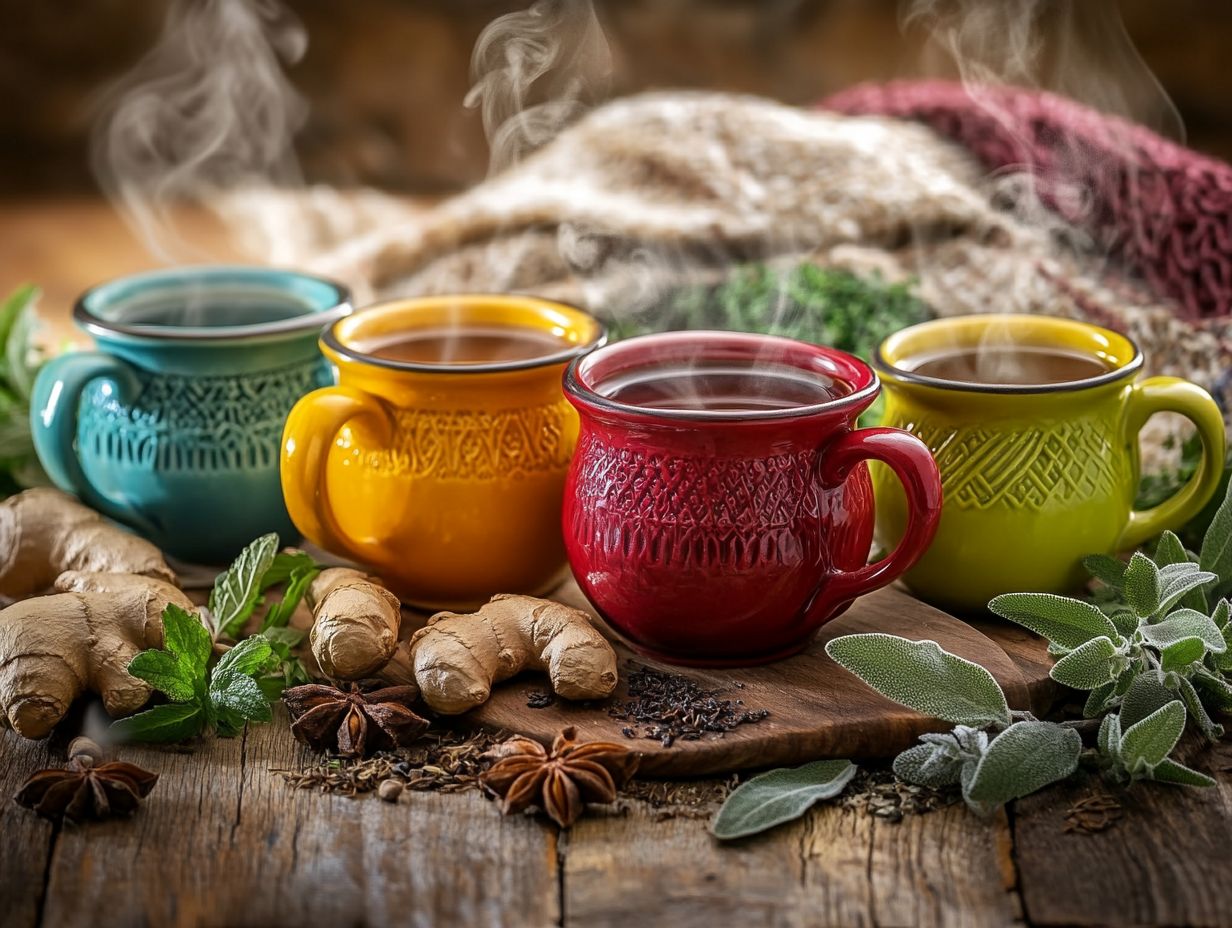
- Try Ginger Tea for a warming and soothing drink that helps with digestive issues and reduces inflammation in the body.
- Experience the benefits of Turmeric Tea, which also aids in digestion and improves skin health.
- Cinnamon Tea adds a spicy kick to your beverage and has been shown to lower blood sugar levels and improve heart health. It s beloved by many who embrace the tea culture during the cozy winter months.
1. Ginger Tea
Ginger tea is a cherished herbal beverage that offers warmth for those chilly winter days and a wealth of health benefits, making it a favorite among tea lovers during the colder months.
Rooted in ancient Asian traditions, particularly in India and China, this aromatic drink is crafted by steeping fresh or dried ginger in hot water. The vibrant, spicy notes of ginger create a distinctive flavor. You can elevate it with a touch of honey or a squeeze of lemon, resulting in a comforting blend that delights the senses.
As a revered herbal remedy, ginger tea is known for its ability to bolster the immune system and enhance digestion. Its soothing properties warm the body and cultivate a sense of tranquility, making it ideal for savoring while curled up with a captivating book or enjoying serene moments with loved ones.
2. Turmeric Tea
Turmeric tea, often enhanced with ginger, presents a vibrant golden hue alongside a multitude of health benefits, making it a cherished addition to any cozy winter tea collection especially for those in search of warming herbal remedies.
This ancient beverage has deep roots in Ayurvedic medicine, with its rich history intricately woven into cultural rituals and healing practices. When preparing turmeric tea, think of it as a canvas for a delightful medley of spices. You can blend it with various chai mixes, incorporating ingredients like cinnamon, black pepper, and cardamom. Each spice not only adds unique flavors but also brings its own health benefits.
The anti-inflammatory benefits of turmeric are well-documented, making this tea a favored choice for anyone aiming to strengthen their immunity during the colder months. As it warms both your body and soul, this aromatic drink does more than just comfort; it nurtures a connection to centuries of tradition, much like the 5 healing teas for seasonal allergies that can also provide soothing relief.
3. Cinnamon Tea
Cinnamon tea is a fragrant and warming herbal infusion that delights your senses and offers a plethora of health benefits. It’s no wonder it has become a beloved choice for those looking to immerse themselves in the cozy winter tea culture.
Its origins trace back to ancient civilizations in Southeast Asia, where the bark of the cinnamon tree was cherished for its unique flavor and medicinal properties. To prepare this comforting beverage, you typically infuse cinnamon sticks or ground cinnamon in hot water, often enhancing it with a touch of honey or a splash of citrus for added layers of flavor.
The resulting brew presents a sweet, spicy profile that warms your palate and evokes nostalgia. Beyond its delightful taste, this tea plays a significant role in improving digestion and soothing your stomach. For those looking to explore more options, consider trying 5 herbal teas to soothe your cold symptoms. Incorporating cinnamon tea into your daily wellness routine is not just a treat for your taste buds; it’s a step toward nurturing your health.
We’d love to hear about your experiences with spicy herbal teas! Try making these teas at home, including the top 7 herbs for immune-boosting teas, and share your thoughts with us.
4. Clove Tea
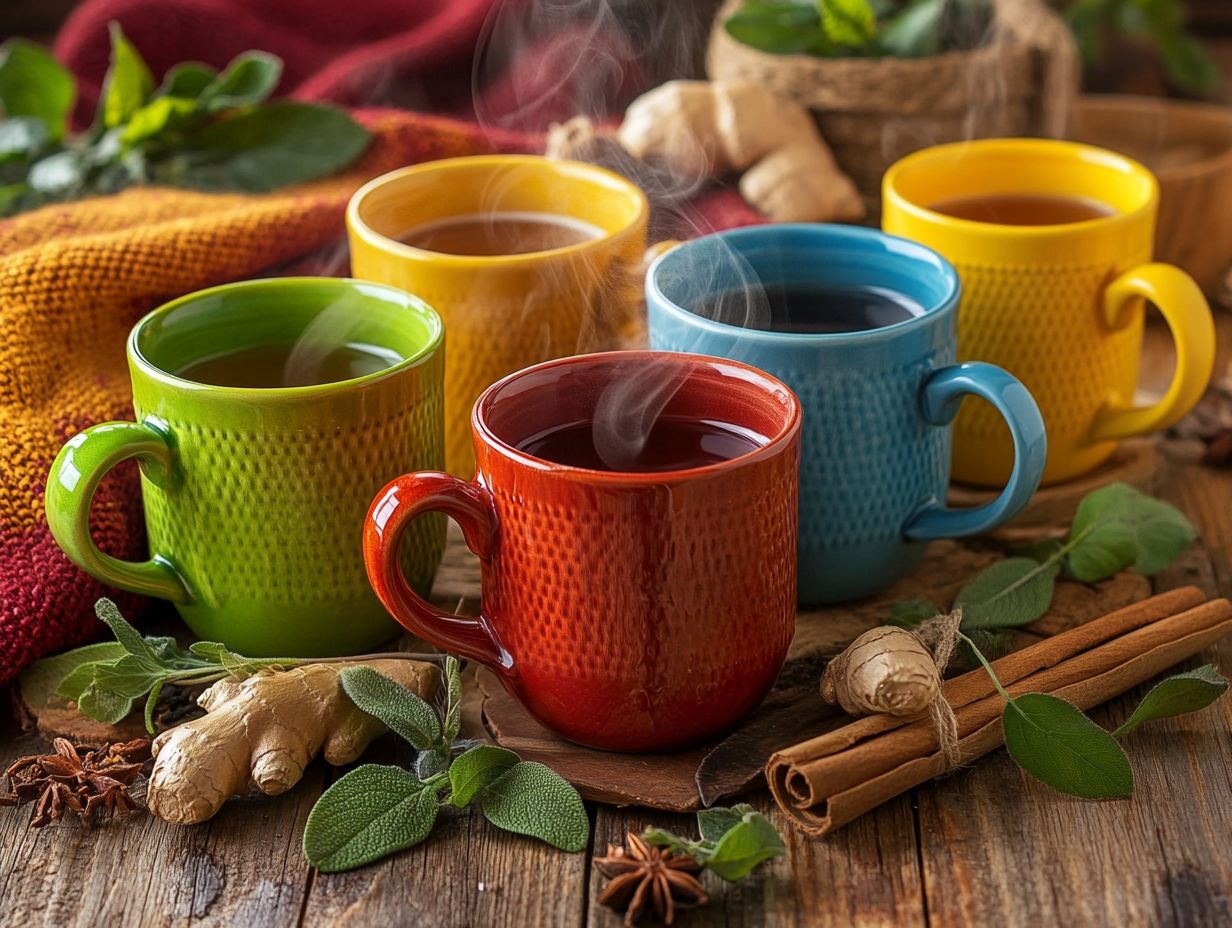
Clove tea, with its warm and fragrant qualities, isn’t just a delightful indulgence for chilly days; it also offers numerous health benefits that make it a favorite in many winter spiced chai blends.
This enchanting brew is made by steeping whole or ground cloves in hot water, allowing their rich and spicy essence to infuse every cup. With its warm aroma, clove tea provides a soothing experience that invites you to unwind and relax.
Beyond its delightful flavor, this herbal infusion is known for its antioxidant properties, which help combat oxidative stress. It also aids digestion, soothing an upset stomach and promoting overall gut health. This makes it a delicious choice for those focused on health.
5. Cayenne Pepper Tea
Cayenne pepper tea offers a spicy kick that warms you on chilly days and brings a wealth of health benefits, making it a great addition to your winter tea collection.
This vibrant infusion combines the fiery essence of cayenne pepper with hot water, resulting in a robust drink that truly awakens the senses. Its piquant flavor strikes a perfect balance between heat and earthiness, catering to those who enjoy bold tastes.
Cayenne pepper tea is renowned for its impressive health benefits. Regularly sipping this spicy brew can boost your metabolism, aid in weight management, and enhance circulation making it a perfect choice to invigorate the body.
Whether enjoyed alone or mixed with honey and lemon, this tea is an exceptional addition to any wellness routine, along with other options like rooibos tea or chamomile tea.
What Are the Health Benefits of Spicy Herbal Teas?
Spicy herbal teas made with ginger, turmeric, and cayenne pepper provide numerous health benefits. They re not just enjoyable sips for cozy winter evenings; they also serve as powerful immunity boosters against seasonal ailments.
These brews are packed with compounds that promote digestive health, soothing an upset stomach and reducing bloating. For instance, ginger tea aids digestion by stimulating the production of digestive enzymes. Meanwhile, turmeric tea has anti-inflammatory properties that ease discomfort and enhance your body’s defenses, contributing to overall wellness.
Rich in antioxidants, these herbal infusions combat oxidative stress and may help lower the risk of chronic diseases. By incorporating these 5 unique herbal teas from around the world into your daily routine, you can enjoy holistic health improvements that offer more than just warmth on a chilly day.
How Can Spicy Herbal Teas Help with Digestion?
Spicy herbal teas, particularly those infused with ginger, turmeric, and cinnamon, are known for their ability to aid digestion and enhance gut health. Consider them essential allies in your winter wellness routine.
These teas not only warm you during chilly months but also provide benefits that directly support digestive health. For example, Ginger contains compounds called gingerols, which ease gastrointestinal discomfort and help your body process food smoothly. You can also explore 5 delightful DIY herbal teas for wellness to enhance your health even further.
Turmeric features the active ingredient curcumin, known for its anti-inflammatory properties that soothe bloating and irritation in the digestive tract. Additionally, cinnamon boosts digestion by enhancing insulin sensitivity, a valuable benefit for managing blood sugar levels.
When combined, these spices create a potent blend, making spicy herbal teas a delicious way to nurture gut health while bolstering immune function and overall vitality. Don’t miss out on the chance to boost your health with the 5 best herbal teas for digestive health!
What Are the Potential Risks of Drinking Spicy Herbal Teas?
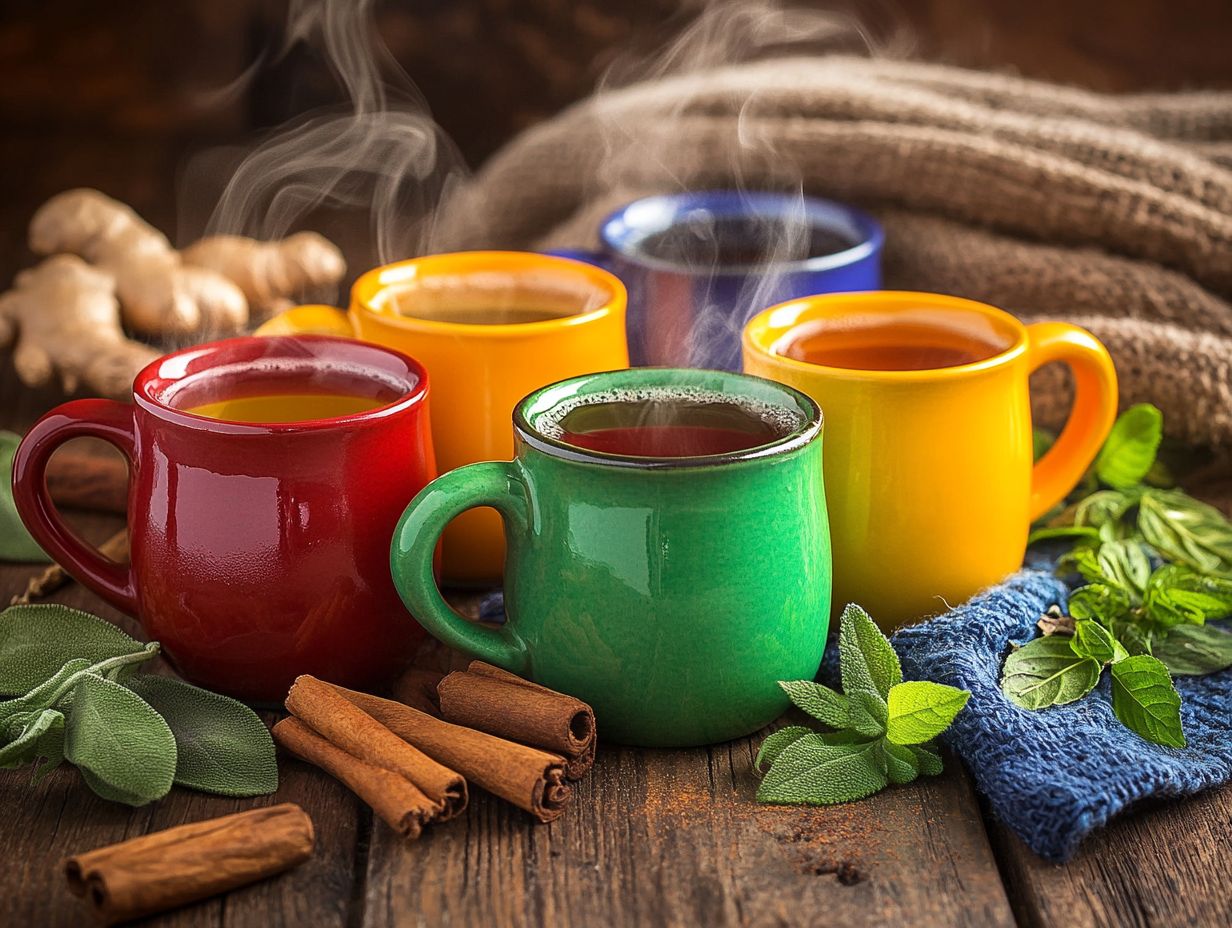
You might relish the numerous health benefits of spicy herbal teas. However, it’s crucial to acknowledge the potential risks involved.
Ingredients like cayenne pepper or ginger can sometimes lead to gastrointestinal discomfort, which means discomfort in your stomach or intestines, or allergic reactions.
If you overindulge in these robust blends, you could experience heartburn. This is especially true if your stomach tends to be on the sensitive side.
Some individuals may also find themselves prone to allergies from specific herbal components. This can lead to skin irritations or, in more severe cases, serious reactions.
Therefore, as a tea enthusiast, it s essential for you to enjoy these flavorful brews in moderation. Striking a balance in your spicy herbal tea consumption can help you maximize its uplifting effects while minimizing any unwanted side effects.
This approach ultimately ensures a delightful tea-drinking experience that supports your overall wellness rather than hindering it.
How Can One Incorporate Spicy Herbal Teas into Their Diet?
Incorporating spicy herbal teas into your diet isn t just enjoyable; it s a delightful boon for your health. Imagine savoring the warming effects of ingredients like ginger, turmeric, and cinnamon while immersing yourself in the rich tapestry of tea culture.
These aromatic blends can seamlessly integrate into your daily routine. Picture this: a robust ginger tea serving as a flavorful base for your soups or marinades, infusing your savory dishes with a tantalizing kick.
Consider adding them to your smoothies. This will provide a vibrant twist to your favorite fruit combinations.
A splash of fresh citrus mixed with spicy herbal teas can transform a simple drink into a refreshing iced beverage, making hydration feel like a luxurious experience.
The versatility of these teas is truly inspiring, enhancing both meals and drinks with their unique zest.
Are There Any Precautions to Take When Drinking Spicy Herbal Teas?
When you indulge in spicy herbal teas, it’s essential to take some precautions, especially if you have underlying health conditions or are pregnant. Ingredients like cayenne pepper and ginger can interact with medications or lead to discomfort.
Before you dive into these flavorful brews, consider any potential allergies or sensitivity you might have. If you suffer from respiratory issues or gastrointestinal disorders, certain spices could potentially worsen your symptoms.
Equally important is to consult your healthcare provider for personalized guidance based on your health conditions. This way, you can ensure that enjoying spicy herbal teas enhances your wellness rather than posing unnecessary risks.
Stay mindful of these factors! You can enjoy the unique benefits of these invigorating blends while keeping your health in check.
What Are Some Other Spices That Can Be Used in Herbal Teas?
Beyond the usual suspects like ginger and turmeric, you can explore a treasure trove of spices to elevate your herbal teas, enhancing both flavor and health benefits. Think cinnamon, clove, and even intriguing options like blue peaflower and rooibos.
Each spice adds its own unique flair to your brew. Take cinnamon, for instance; it not only contributes a warm, sweet profile but is also renowned for its potential to help regulate blood sugar levels and reduce inflammation.
Then there s clove, with its bold aroma and slightly bitter notes, celebrated for its rich antioxidant properties and digestive support.
If you re feeling adventurous, blue peaflower introduces a stunning blue hue alongside its anxiety-relieving benefits. Rooibos naturally caffeine-free offers a nutty flavor that s believed to support heart health.
These spices do more than just enhance the taste; they carry rich cultural significance, deeply rooted in traditions that emphasize their health-promoting qualities.
Frequently Asked Questions
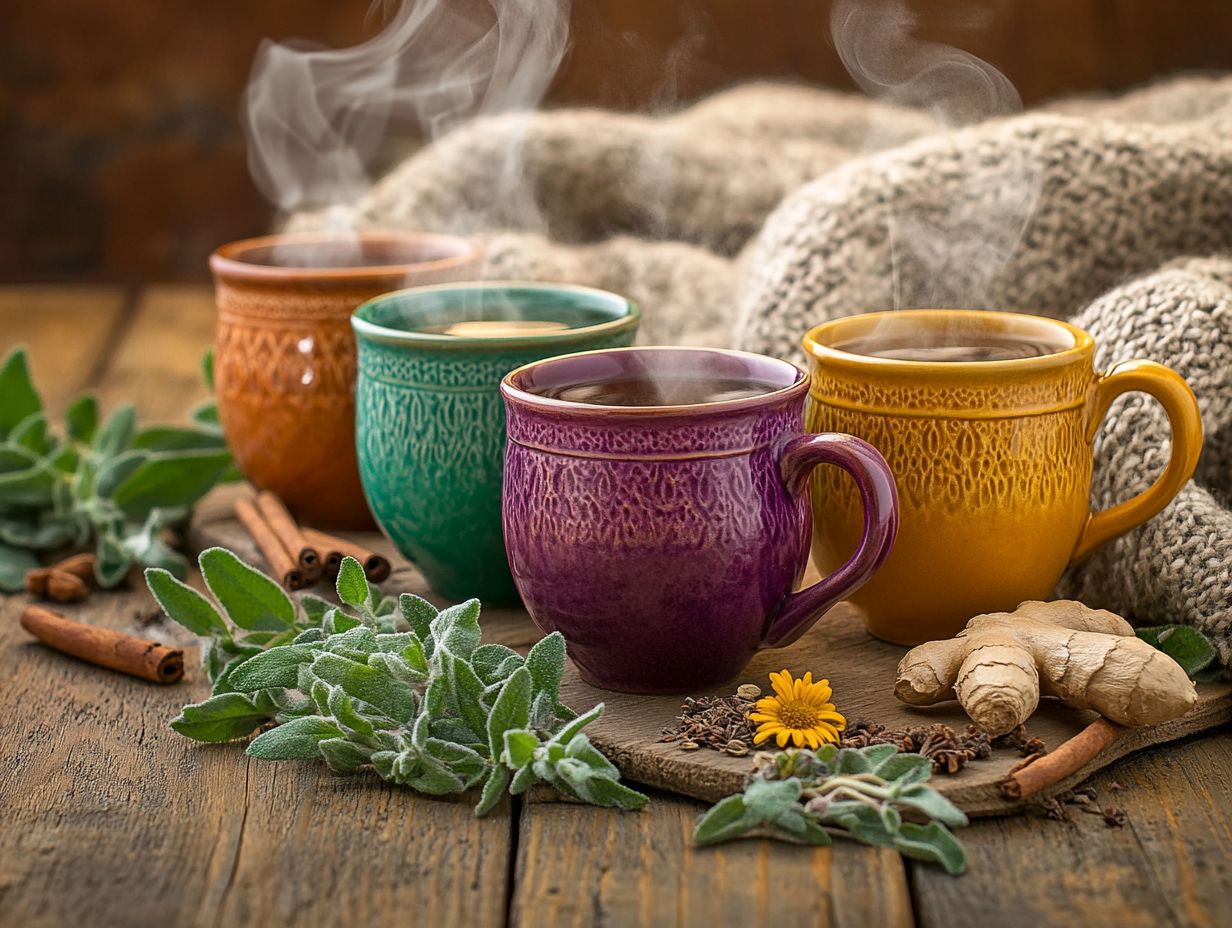
What are the benefits of drinking spicy herbal teas?
Spicy herbal teas can help boost your metabolism and aid in digestion. They also have anti-inflammatory properties and can provide a natural energy boost.
Which herbs are typically used in spicy herbal teas?
Common herbs in spicy herbal teas include ginger, cinnamon, turmeric, cayenne pepper, and peppermint.
Can spicy herbal teas help with cold and flu symptoms?
Yes! These teas can help reduce congestion and soothe a sore throat during cold and flu season.
Are there any potential side effects of drinking spicy herbal teas?
Some people might experience stomach upset or heartburn. Start with small amounts to see how your body reacts.
How should I prepare spicy herbal teas to get the most benefits?
Steep the herbs in hot water for at least 10 minutes. Adding lemon juice or honey enhances flavor and boosts health benefits.
Can I drink spicy herbal teas every day?
Absolutely! Enjoy a cup daily, but vary the types to maximize health benefits. Don’t miss out on the variety!


